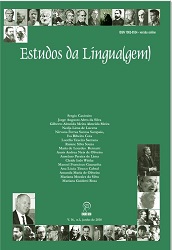The role of discourse of someone else in chronicle
DOI:
https://doi.org/10.22481/el.v16i1.4883Abstract
The voice of the other is present in our everyday speech, in rhetorical saying, and in literary discourse. Under these conditions and from a Bakhtian dialectical and polyphonic perspective (1981, 1992), this article aims to identify and understand how the discourse of the other, shown or veiled, according to Authier-Revuz (1982, 1998) . For that, we selected two chronicles, both published in the newspaper Zero Hora (RS), in order to analyze under what discursive-linguistic strategies the voice of the other is manifested, as well as the effects of meaning it produces in the text. We investigate the operation of free direct, indirect and indirect speeches, as well as other indicators, marked or not, relating them to the speaker's / narrator's words, which at the same time seeks to move closer to the other, depending on the semantic effect it seeks to produce. The voice of the other is present in our everyday speech, in rhetorical saying, and in literary discourse. Under these conditions and from a Bakhtian dialectical and polyphonic perspective (1981, 1992), this article aims to identify and understand how the discourse of the other, shown or veiled, according to Authier-Revuz (1982, 1998) . For that, we selected two chronicles, both published in the newspaper Zero Hora (RS), in order to analyze under what discursive-linguistic strategies the voice of the other is manifested, as well as the effects of meaning it produces in the text. We investigate the operation of free direct, indirect and indirect speeches, as well as other indicators, marked or not, relating them to the speaker's / narrator's words, which at the same time seeks to move closer to the other, depending on the semantic effect it seeks to produce.Downloads
Downloads
Published
Issue
Section
License

Estudos da Língua(gem) is licensed under a Creative Commons Attribution 4.0 International License.
Authors who publish in the journal Estudos da Língua (gem) agree with the following terms:
The journal Estudos de Língua(gem) maintains the copyrights of the contributions published. These rights include the publication of the contribution and make its content available for free through the portal.













